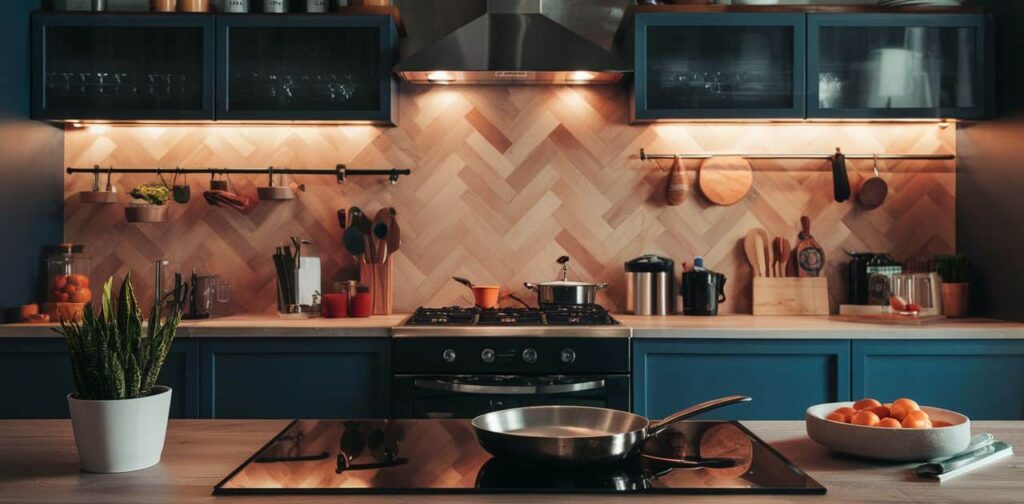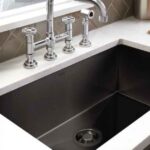We’ve all been there standing in the cookware aisle, eyeing those shiny aluminum pans. They’re affordable, lightweight, and excellent heat conductors. But a nagging voice whispers: “Are they safe?”
Aluminum cookware has sparked debates for decades. Some swear by its performance, while others avoid it like the plague. In this comprehensive guide, we’ll dive deep into the science, address common concerns, and uncover practical tips.
Get ready to separate facts from fiction and make an informed decision about using aluminum pans in your kitchen.
The Aluminum Debate: A Brief History
The controversy surrounding aluminum cookware can be traced back to the 1960s. A theory emerged, known as the “Aluminum Hypothesis,” suggesting a link between aluminum exposure and Alzheimer’s disease.
- This hypothesis shook the cookware world, leading many to ditch their trusty aluminum pans.
- The belief that aluminum could leach into food, accumulate in the brain, and contribute to neurological diseases fueled widespread concern.
However, as we’ll explore, more recent studies have failed to find a clear connection between aluminum exposure and Alzheimer’s risk.
Why Aluminum is a Popular Choice for Cookware
Despite the debates, aluminum cookware remains a staple in kitchens worldwide. But why is it so popular? Let’s break it down:
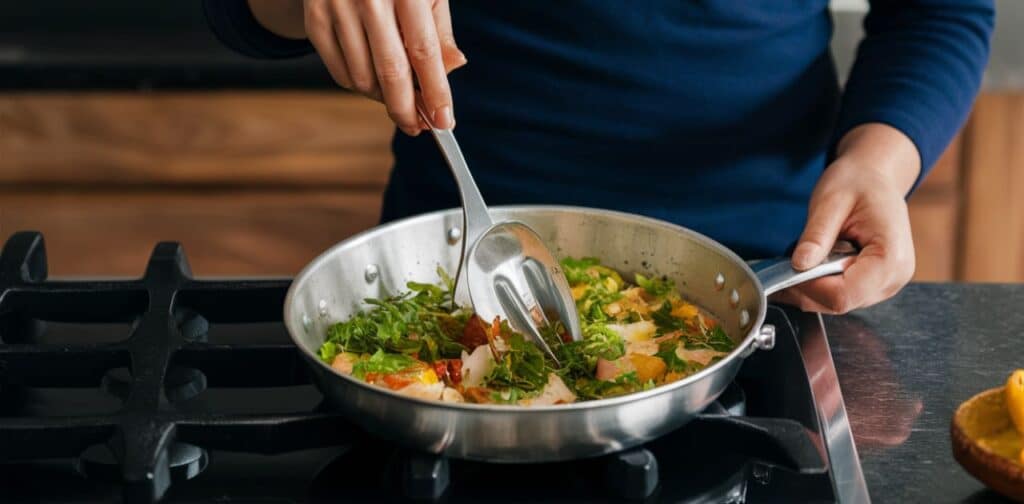
Excellent Heat Conductivity
One of aluminum’s biggest selling points is its exceptional heat conductivity. It heats up quickly and distributes heat evenly across the surface, ensuring precise temperature control and even cooking.
This property makes aluminum ideal for various cooking techniques, from searing steaks to delicate sauces. Plus, it responds rapidly to heat adjustments, allowing for on-the-fly tweaks during cooking.
Affordability
Compared to alternatives like copper or stainless steel, aluminum cookware is a budget-friendly option. Its affordability makes it accessible to a broad range of consumers, regardless of their budget constraints.
Lightweight
Have you ever struggled with a heavy pot or pan? Aluminum’s lightweight nature is a game-changer, especially for larger cookware. Its easy maneuverability reduces strain and fatigue in the kitchen.
Durability and Versatility
While aluminum may not be as inherently durable as cast iron, it can still withstand years of use with proper care. Many aluminum pots and pans feature nonstick or anodized surfaces, enhancing their longevity and resistance to corrosion.
Additionally, aluminum cookware is versatile enough for various cooking methods, from frying and sautéing to boiling and baking.
The Potential Risks of Aluminum Cookware
Now, let’s address the elephant in the room: the potential risks associated with aluminum cookware.
Aluminum Leaching
One of the primary concerns with aluminum pans is the possibility of aluminum leaching into food. When exposed to certain acidic or alkaline foods, aluminum can dissolve and migrate into the dish being cooked or stored.
However, it’s essential to understand that small amounts of aluminum exposure are not necessarily harmful.
According to Health Canada, Canadians typically consume around 10 milligrams of aluminum daily, primarily from food sources. Aluminum cookware contributes only 1-2 milligrams to this total.
Health Concerns
Despite the leaching potential, there is no scientific evidence linking aluminum exposure from cookware to Alzheimer’s disease or other neurological disorders. The initial “Aluminum Hypothesis” has been largely debunked by more recent studies.
That said, excessive aluminum intake has been associated with potential health risks, particularly for individuals with kidney disease or decreased renal function. Moderation and caution are advisable when using aluminum cookware.
Debunking the Aluminum-Alzheimer’s Myth
Let’s address the persistent myth linking aluminum pans to Alzheimer’s disease. This belief stemmed from the observation that aluminum was present in the brains of individuals with Alzheimer’s.
However, more recent and comprehensive research has not found a clear causal relationship between aluminum exposure and the development of Alzheimer’s disease. In fact, the Alzheimer’s Association has stated that there is no scientific evidence to support this myth.
While the origins of Alzheimer’s disease are still being investigated, researchers have identified other risk factors, such as age, genetics, and lifestyle choices. Aluminum pans have been largely exonerated in this debate.
Anodized Aluminum
A Safer Alternative If you’re still hesitant about using traditional aluminum cookware, anodized aluminum pans offer a compelling solution. These pans undergo a specialized process that creates a durable, non-reactive surface, mitigating the concerns associated with aluminum leaching.
The Anodization Process
Anodization involves immersing the aluminum cookware in an acidic electrolyte bath and passing an electric current through it. This process creates a hard oxide layer on the surface, making it incredibly durable and non-reactive.
Standard Anodized vs. Hard Anodized
It’s important to note that not all anodized aluminum cookware is created equal. Standard anodized aluminum undergoes a basic anodization process, while “hard anodized” aluminum endures a more intensive treatment.
Hard anodized aluminum pans feature an even harder and more durable surface, highly resistant to scratching, corrosion, and wear. This added durability extends the lifespan of your cookware and further reduces the risk of aluminum leaching.
Benefits of Anodized Aluminum
- By choosing anodized aluminum cookware, you can enjoy the excellent heat conductivity of aluminum while addressing safety concerns.
- The anodized surface is less likely to react with acidic or alkaline foods, minimizing the risk of flavor changes or harmful chemical reactions.
- Additionally, anodized aluminum pans are scratch-resistant and less prone to warping or denting, ensuring longevity in your kitchen.
The Controversy Over Old Aluminum Pans
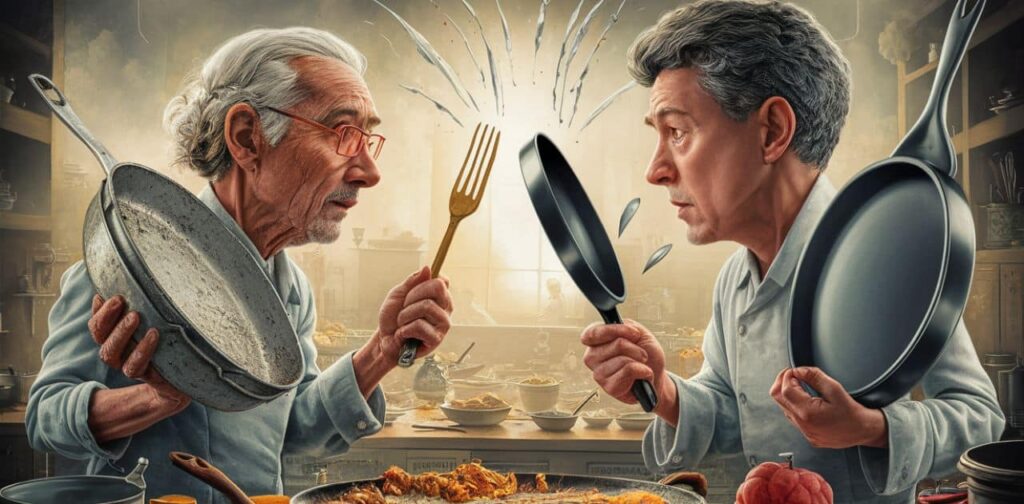
While we’ve addressed the safety concerns surrounding aluminum cookware, it’s essential to consider the age and condition of your pans. Older aluminum pans may pose a higher risk due to wear and tear, potentially increasing the likelihood of aluminum leaching.
Underlying Concerns About Aluminum Cookware
Even with the lack of a direct link to Alzheimer’s, some experts still advise caution when using aluminum cookware, especially for individuals with kidney disease or decreased renal function. This is because the body has a harder time filtering and eliminating excess aluminum.
Additionally, older aluminum pans may have been produced with less stringent safety standards or manufacturing processes, potentially increasing the risk of aluminum leaching or other issues.
Exploring Health Risks of Aging Aluminum Pans
As aluminum pans age, their surfaces can become scratched, pitted, or worn down, increasing the surface area exposed to acidic foods. This enhanced exposure can lead to higher levels of aluminum leaching into your meals.
Furthermore, the long-term effects of consuming trace amounts of aluminum over many years are not well understood. While the immediate risks may be low, the potential for cumulative effects on neurological or other bodily systems cannot be entirely ruled out.
The Issue of Metal Leaching in Cooking
It’s not just aluminum that can potentially leach into food; other metals used in cookware, such as copper or iron, may also pose risks if consumed in excessive amounts. This highlights the importance of using appropriate cookware for specific cooking tasks and maintaining proper care and maintenance.
Safer Alternatives to Aluminum Cookware
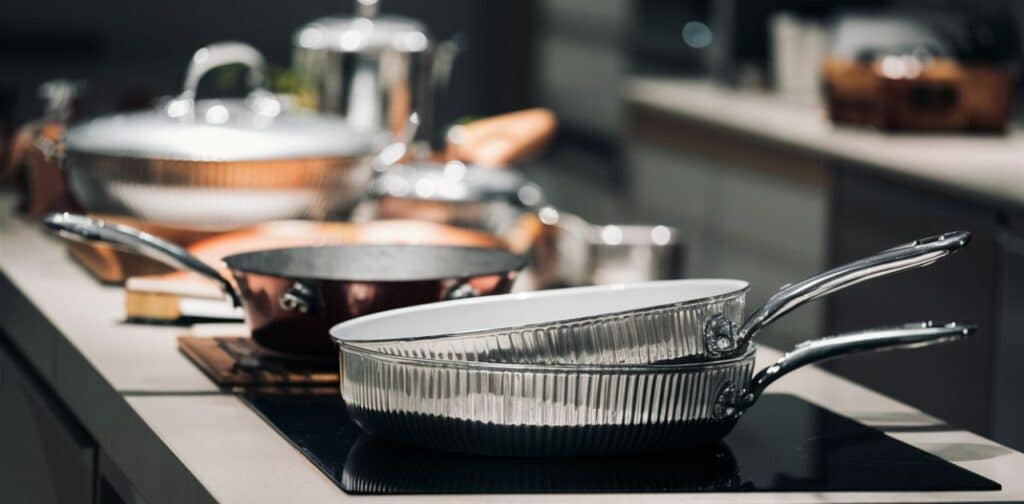
If you’re still hesitant about using aluminum cookware, even the anodized variety, there are several safer alternatives to consider for your kitchen:
Stainless Steel
Stainless steel cookware is a popular and safe choice for many home cooks and professional chefs alike. It’s non-reactive, meaning it won’t leach harmful chemicals or impart metallic flavors to your food.
Stainless steel is also highly durable, resistant to scratches and dents, and easy to clean. However, it’s important to note that stainless steel is not as efficient at conducting heat as aluminum, which may require adjustments in cooking techniques.
Cast Iron and Enamel-Coated Cast Iron
Cast iron cookware has been a kitchen staple for generations, prized for its excellent heat retention and distribution. While uncoated cast iron can potentially leach iron into acidic foods, properly seasoned and maintained cast iron pans are generally safe to use.
For added peace of mind, enamel-coated cast iron pans provide a non-reactive surface that eliminates the risk of leaching. These pans combine the superior heat distribution of cast iron with a durable, easy-to-clean enamel coating.
Ceramic Cookware
Ceramic cookware, crafted from natural clay materials, is another non-toxic and eco-friendly option. These pans are non-reactive and free from harmful chemicals like PFOA (perfluorooctanoic acid) or PTFE (polytetrafluoroethylene), commonly found in some non-stick coatings.
While ceramic cookware may not conduct heat as efficiently as aluminum, it offers a safe and sustainable choice for health-conscious cooks.
Avoiding PFOA and PTFE
Speaking of non-stick coatings, it’s essential to be wary of cookware containing PFOA or PTFE, as these chemicals have been linked to potential health risks.
PFOA [ Perfluorooctanoic Acid ]:
PFOA, once used in the production of non-stick coatings like Teflon, has been phased out in many countries due to concerns about its potential toxicity. However, older non-stick pans may still contain traces of PFOA, so it’s best to replace them with safer alternatives.
PTFE [ Polytetrafluoroethylene ]:
PTFE, the primary component of Teflon, has also faced scrutiny due to the potential release of toxic fumes when heated to extremely high temperatures. While modern PTFE-based non-stick coatings are considered safe for normal cooking temperatures, it’s essential to follow the manufacturer’s guidelines and avoid overheating these pans.
Best Practices for Safe Cooking
Regardless of your cookware choice, following best practices for safe cooking can help minimize potential risks and ensure your kitchen remains a haven for healthy meals.
Proper Use and Maintenance of Cookware
- Always follow the manufacturer’s instructions for use and care.
- Avoid using abrasive scrubbers or harsh cleaners that can scratch or damage the cookware’s surface.
- Replace cookware with significant signs of wear, such as deep scratches, pitting, or peeling coatings.
- Consider using wooden, silicone, or plastic utensils to prevent scratching non-stick surfaces.
Handling Acidic Foods
- Be cautious when cooking acidic foods like tomatoes, citrus fruits, or vinegar-based dishes in aluminum or uncoated cookware.
- Consider using anodized aluminum, stainless steel, or enamel-coated pans for these types of recipes.
- Avoid prolonged storage of acidic foods in aluminum containers.
Avoiding Overheating and Scratches
- Never preheat an empty pan, as this can lead to warping or damage.
- Avoid exposing non-stick coatings to excessive heat, which can cause them to break down and release potentially harmful fumes.
- Use caution when stacking or storing cookware to prevent scratches or dents, which can compromise the surface and increase the risk of leaching.
By following these simple guidelines, you can prolong the lifespan of your cookware and minimize potential health risks associated with metal leaching or exposure to harmful chemicals.
FAQs: Addressing Common Concerns
Can aluminum leach from aluminum cookware?
Yes, aluminum can potentially leach from aluminum cookware, particularly when exposed to acidic or alkaline foods. However, the amount of leaching is typically minimal and within safe levels for most individuals with normal kidney function.
Is anodized aluminum cookware safer?
Anodized aluminum cookware is generally considered safer than traditional aluminum cookware. The anodization process creates a durable, non-reactive surface that reduces the risk of aluminum leaching into food.
What are some signs of wear and tear on an aluminum pan that might make it unsafe?
Signs of wear and tear that may make an aluminum pan unsafe include deep scratches, pitting, warping, or peeling of any non-stick coatings. These conditions can increase the surface area exposed to food and potentially lead to increased aluminum leaching.
What alternative materials should be used for cooking if old aluminum pans are unsafe?
If you’re concerned about the safety of your old aluminum pans, consider switching to safer alternatives like stainless steel, cast iron (or enamel-coated cast iron), or ceramic cookware. These materials are non-reactive and free from harmful chemicals.
What are the healthiest pans to cook with?
The healthiest pans to cook with are stainless steel, cast iron, enamel-coated cast iron, anodized aluminum (with a non-stick coating), and ceramic cookware. These materials are non-reactive and free from potentially harmful chemicals like PFOA or PTFE.
Is aluminum cookware toxic-free?
Aluminum cookware is generally considered non-toxic when used properly. However, there is a potential for aluminum leaching, especially when cooking acidic or alkaline foods. Individuals with kidney disease or decreased renal function may need to exercise extra caution when using aluminum cookware.
What pans do chefs prefer?
Professional chefs tend to prefer stainless steel pans for their durability, non-reactive properties, and ease of cleaning. Stainless steel withstands the rigors of a professional kitchen and ensures no unwanted flavors or metals leach into dishes.
How do I know if my pans are safe?
To ensure your pans are safe, look for labels indicating they are PFOA-free and non-toxic. Identify the material (stainless steel, cast iron, enamel, anodized aluminum, or ceramic) and inspect for signs of wear, scratches, or peeling coatings. Damaged cookware should be replaced.
How is Teflon still legal?
Teflon (PTFE-based non-stick coatings) is still legal because modern versions have removed PFOA, a potentially hazardous substance, from their composition. However, concerns persist about the release of toxic fumes at extremely high temperatures and the potential health risks associated with PTFE itself.
Why is PTFE banned?
PTFE (polytetrafluoroethylene) itself is not banned, but PFOA (perfluorooctanoic acid), a chemical previously used in the production of non-stick coatings like Teflon, has been banned or phased out in many countries due to its potential toxicity and links to various health problems.
What Health Risks Are Associated With Using Older Aluminum Pans?
Older aluminum pans may pose a higher risk of aluminum leaching due to wear and tear, potentially increasing exposure to aluminum. Excessive aluminum intake has been associated with potential neurological and bone health risks, particularly for individuals with kidney disease or decreased renal function.
Can An Old Aluminum Pan Be Cleaned Or Restored To Its Original Safety Level?
It is generally not recommended to attempt to restore or continue using an old, heavily worn aluminum pan. The surface damage and increased exposure area can make it challenging to ensure safe aluminum leaching levels during cooking.
How Do I Know If My Aluminum Pan Is Old?
Signs that an aluminum pan is old and potentially unsafe include significant scratches, dents, warping, or peeling of any non-stick coatings. Additionally, pans manufactured before the early 2000s may have been produced with less stringent safety standards.
Isn’t it toxic to be cooking with aluminum pans?
Aluminum cookware is generally not considered toxic when used properly and in moderation. However, excessive aluminum exposure from leaching can potentially lead to health risks, particularly for individuals with kidney disease or decreased renal function. Using anodized aluminum or safer alternatives like stainless steel or ceramic cookware can minimize these risks.
Is it healthy to cook food in nonstick pans?
Modern non-stick pans that are PFOA-free and used within the recommended temperature ranges are generally considered safe for cooking food. However, it’s essential to avoid overheating these pans, as high temperatures can cause the release of potentially harmful fumes. Additionally, scratched or damaged non-stick surfaces should be replaced to prevent potential chemical exposure.
Conclusion
In the quest for safe and practical cookware, it’s essential to separate facts from fiction. While aluminum cookware has faced scrutiny, modern anodized aluminum pans offer a compelling solution, combining the benefits of excellent heat conductivity with a durable, non-reactive surface.
By understanding the science behind aluminum cookware and making informed decisions, you can enjoy delicious meals without compromising your health. Remember, a well-equipped kitchen is the foundation of culinary excellence, and knowledge is the key to unlocking its full potential.
Whether you choose anodized aluminum, stainless steel, cast iron, or ceramic cookware, prioritize safety, follow best practices, and replace worn or damaged pieces. Your health and the health of your loved ones are worth investing.
Thehometrotters .Com Home Decor Ideas
What Happened To Jonathan From Hell’s Kitchen

Howdy is behind this home blog, sharing personal stories, thoughts, and insights from daily life. I can dedicated to bringing you the latest trends, expert advice, and creative ideas to make your home the sanctuary you’ve always dreamed of. Whether you’re looking for DIY tips, home decor inspiration, home loans, rentals or renovations.

